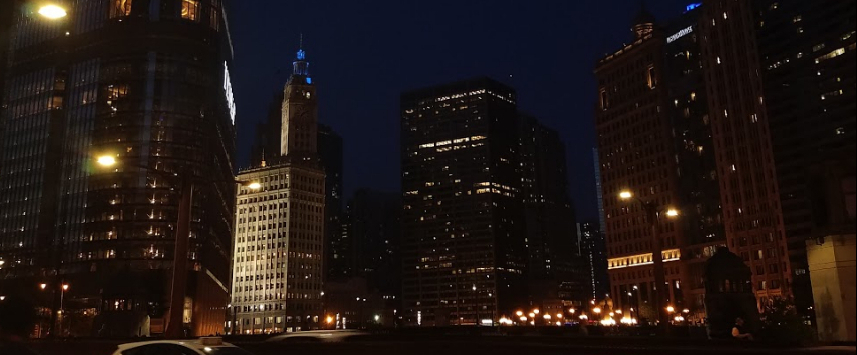A Space Without Limits: The Power of Art in Politics & Society
This article was written by Connor Satterlee, a freshmen biology major and Student Government senator.
A little over a week ago the 60th annual Grammy Awards aired on CBS nationwide. While ratings may have hit an all-time low for the award show, the resulting controversy and political discussion is one of the greatest in the show’s history. The awards began with a skit made by the newly-popular talk-show host, James Corden, in which he satirically auditioned other celebrities as nominees for the “best spoken word album” award by reading the highly-controversial Trump exposé, Fire and Fury. The skit ended with a surprise appearance by Hillary Clinton who read a section from the book on how Donald Trump, in his fear of being poisoned, only trusted McDonald’s to be safe.
Without skipping a beat members of the Trump Administration immediately began backlashing on Twitter, with Donald Trump Jr. tweeting this:
“Getting to read a #fakenews book excerpt at the Grammys seems like a great consolation prize for losing the presidency. #GrammyAwards”
Additionally, US Ambassador to the UN Nikki Haley tweeted this:
“I have always loved the Grammys but to have artists read the Fire and Fury book killed it. Don’t ruin great music with trash. Some of us love music without the politics thrown in it.”
Now, no one should be surprised that the Trump Administration immediately went on the offensive here; it’s what they do. I was, however, surprised by Nikki Haley’s tweet. Not because of anything to do with today’s politics specifically, but because the secondary message she gave in her tweet was that music should be apolitical. To say that music (or art in general) should disregard politics altogether and limit its subject matter to fit this criterion is completely backwards, unaware, and detrimental to the essential functions and operations of society.
The idea of apolitical art is virtually impossible. The very nature of art demands intersection with sociology and politics to some extent or another. For millennia art has impacted and reflected the sociological and political views and issues of individuals on every level of what defines a person. On a micro level, art serves as a sociological tool to be utilized by an individual not only to express personal interpretation of a perspective on something. On a macro level art serves as a unique and exclusive means for an individual to vocalize their perspective to others in a way that other mediums of communication cannot. Sure, bands like The Beatles could have just written a letter to everyone in the 1968 protests saying, “Hey guys, uh, we just wanted to say that we think some of your protest tactics miiiiiiiiiight not be such great ideas”, but by instead taking their core message, leaving gaps for the listeners to fill in, and putting it over a music sample, a simple message became the nationwide best-selling single Revolution. It was blasted over radios and record players across the nation. This is part of what makes art so popular, and to harness that power to voice your own message, political or not, is not only allowed – it’s inevitable.
The other phenomena that makes art so popular in society is the naturally-occurring discussion, emotion, and debate that surrounds great work of art. It almost acts as a codex; the hints and clues aren’t the real message, but the tools used to decipher the codex’s passcode to reveal the true and full message hidden inside. It requires the active participation of the message’s recipient. If you walked up to this painting and analyzed the message it seemed to portray what message would you receive?
This painting, titled Suprematist Composition: White on White, was painted by Kazimir Malevich in 1918, a year after the Russian Revolution, is minimalistic in color and form and marked with Malevich’s hand in the paint’s texture. It uses the skewed and asymmetrical square in the center to represent Russia’s new-found feeling of liberation and freedom:
“The square is not exactly symmetrical, and its lines, imprecisely ruled, have a breathing quality, generating a feeling not of borders defining a shape but of a space without limits.” (The Museum of Modern Art)
Just as with Suprematist Composition: White on White, all music requires the participant to meet the art halfway and figure out the implicit message with the given clues and hints, which is why there is so much room for interpretation and debate around certain pieces of art. Hell, even the lyrics to the famous nursery rhyme Ring Around the Rosie might be worth more than their face value.
The most important thing to remember, however, is that Nikki isn’t necessarily wrong for saying what she did; she was expressing her opinion on something that is innately expressive. To better explain this, I sat down with Dr. Purifoye, an assistant professor of sociology here at North Park, and asked her about the impact of music in out society from a sociological standpoint:
“The interesting thing with music is that, music has been a platform for people for decades, right? It’s not anything new. So then to critique that same platform that music is for being what music is becomes… uh… it’s like it has this contrary side to it.”
“…but that’s not all that music is, but [sic] it’s one thing that it is… it helps us to make meaning of the world in which we live in, and what that meaning is, is fluid.”
When I asked her to further elaborate on what she meant by the meaning of music being fluid and how this relates to Nikki Haley’s comments, she had this to say:
“Nikki was expressing what music is to her and what… and how celebrating music, and watching celebrations of music, and having what she felt was an interruption, is what she was expressing with it. For her it may have been interruptive, right? But for others it may not have been, but one thing that we know [is] that we are free to express, right? Because music itself as well as our constitution tells us that.”
While I cannot claim that all music (and art) is political, I can confidently say that it is all sociological—and by sociology’s definition, politics has been, currently is, and always will be a part the development, structure, and functioning of human society. Yet at the same time, my view of how music impacts society is just that: my view. If sociology can teach us anything it’s that any action is a conglomeration of other events and factors throughout history, and that those events and factors have caused Mrs. Haley and myself to have differing views when it comes to the place of politics in music. So for now, Mrs. Haley, you can have your opinion. We can get into the politics of it later.









